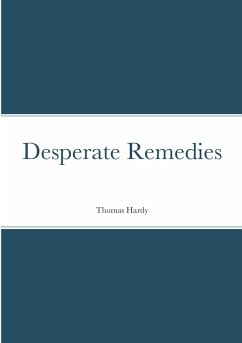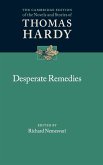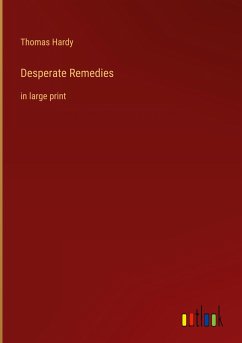DESPERATE REMEDIES IS THE SECOND NOVEL BY THOMAS HARDY, ALBEIT THE FIRST TO BE PUBLISHED. IT WAS RELEASED ANONYMOUSLY BY TINSLEY BROTHERS IN 1871. Plot : Cytherea has taken a position as lady's maid to the eccentric arch-intriguer Miss Aldclyffe. On discovering that the man she loves, Edward Springrove, is already engaged to his cousin, Cytherea comes under the influence of Miss Aldclyffe's fascinating, manipulative steward Manston.Analysis : In Desperate Remedies a young woman, Cytherea Graye, is forced by poverty to accept a post as lady's maid to the eccentric Miss Aldclyffe, the woman whom her father had loved but had been unable to marry. Cytherea loves a young architect, Edward Springrove, but Miss Adclyffe's machinations, the discovery that Edward is already engaged to a woman whom he does not love, and the urgent need to support a sick brother drive Cytherea to accept the hand of Aeneas Manston, Miss Adclyffe's illegitimate son, whose first wife is believed to have perished in a fire however, their marriage is almost immediately nullified when it emerges that his first wife had left the inn before it caught fire. Manston's wife, apparently, returns to live with him, but Cytherea, her brother, the local rector, and Edward come to suspect that the woman claiming to be Mrs. Manston is an impostor. It emerges that Manston killed his wife in an argument after she left the inn, and had brought in the impostor to prevent his being prosecuted for murder, as the argument had been heard (but not seen) by a poacher, who suspected Manston of murder and had planned to go to the police if his wife did not turn up alive. In the novel's climax, Manston attempts to kidnap Cytherea and flee, but is stopped by Edward he later commits suicide in his cell, and Cytherea and Edward marry.Reviews : Blackmail, murder and romance are among the ingredients of Hardy's first published novel, and in it he draws blithely on the 'sensation novel' perfected by Wilkie Collins. Several perceptive critics praised the author as a novelist with a future when Desperate Remedies appeared anonymously in 1871.
Hinweis: Dieser Artikel kann nur an eine deutsche Lieferadresse ausgeliefert werden.
Hinweis: Dieser Artikel kann nur an eine deutsche Lieferadresse ausgeliefert werden.








